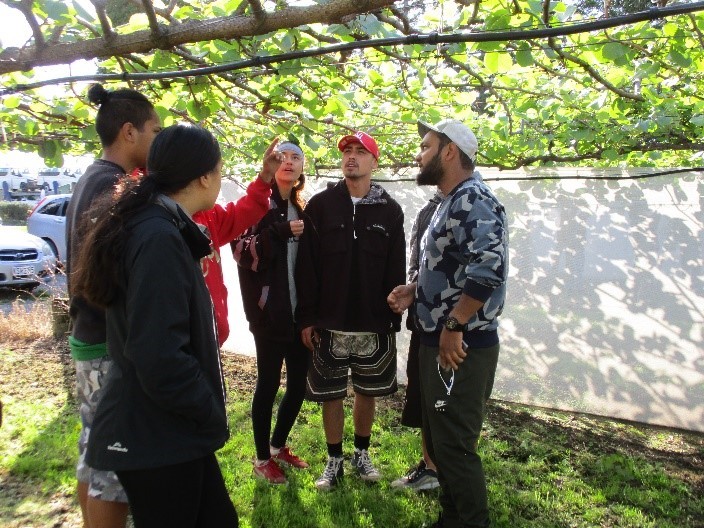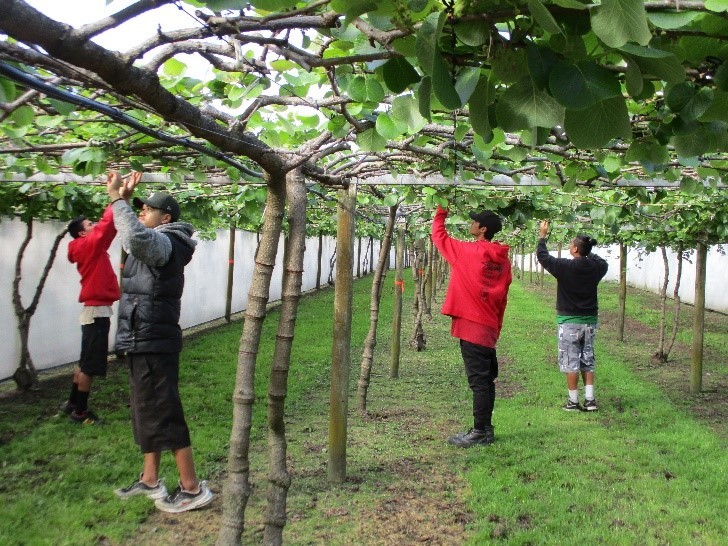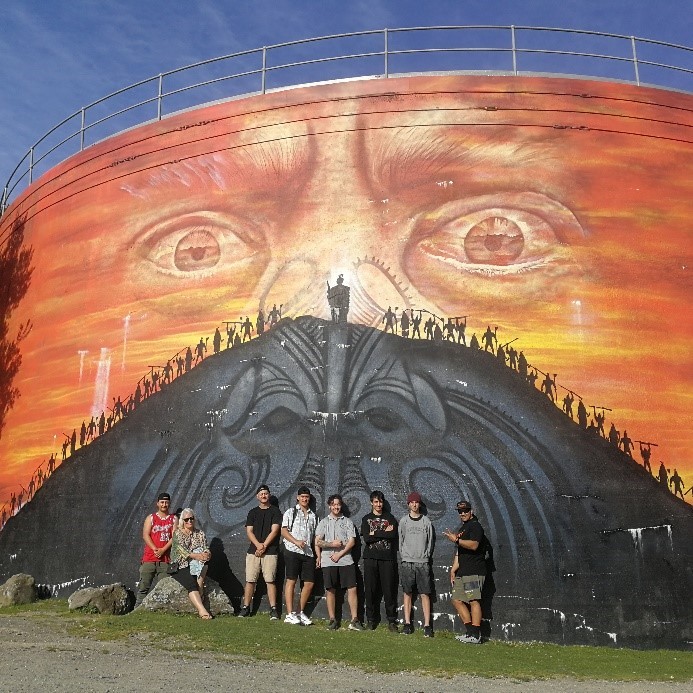Attracting Young People into the Horticulture Sector
As first seen in the Orchardist, December 2019
Sandy Scarrow, National Training Manager, Fruition Horticulture (BOP) Ltd
We are constantly bombarded with news articles about the need to attract both skilled and unskilled workers into the primary sector. The Ministry for Primary Industries[1] 2014 report concluded that the horticulture sector needed to employ an additional 7,800 workers to achieve our development plans, and a further 26,300 workers were needed over the next 13 years to replace the natural attrition of workers. This report is now 5 years old. The growth plans referred to in this report have been rewritten. Off the top of my head I can think of 1 million apple trees going in the ground annually, at least 2,200 ha of Gold3 kiwifruit licence has been released with the reduction of only 700 ha of Green area, therefore a net 1,500 ha of Gold 3, and the area planted in blueberries has increased significantly. Horticulture is the new growth industry for New Zealand. The attraction of another 34,100 into the industry will simply not be enough!
He Tūranga Students Working with Local Contractors
In this article I discuss two programmes that Fruition Horticulture has been proactive in to contribute to growing numbers needed. I then share a few reflections about our learning from these.
The two programmes are the delivery of a Youth Guarantee Tertiary Education Commission (TEC) funded programme, targeting school leavers or those not engaged in employment, education or training, and a new industry exploration programme trialled in Eastern Bay of Plenty. I will discuss these separately and then draw out the learnings.
He Tūranga Mō Te Mahi – Foundations for Employment in Horticulture
The TEC have funded Fruition to deliver the New Zealand Certificate in Primary Industry Skills (Level 2) to youth aged between 15 and 19 years. We are doing this delivery in the Bay of Plenty in close partnership with some employers who, for their part, provide work experience for the learners. Successful graduates of the programme then go into work with the employer who has provided the work experience. We have very purposefully developed a programme that focuses mostly on life skills. In our view, the technical aspects of learning the tasks in horticulture are best taught in the workplace.
He Turanga Students Completing On-Orchard Work Experience
During the delivery we have also partnered with other agencies who have provided pastoral care/support to our learners. These partners range from Marae based Hou Ora, to government agencys such as Youth Justice and Oranga Tamariki through to industry based organisations such as Tūhono Whenua. We have also very purposefully employed tutors on the programme who are very empathetic to the needs of the learner. While some understanding of horticulture is useful for the tutor, we most significantly need tutors who are able to help the learner navigate all sorts of personal issues while on the course so when they graduate, they are able to fully engage in employment. To date, the tutors have had to deal with issues ranging from supporting a learner to open a bank account, track down their birth certificate, gain a drivers licence and deal with police. The lives our learners live are complex, and we are aware that unless we assist them to unpick all the issues that are barriers to them engaging fully in work, they are not going to be much use to horticultural employers. I discussed many of these barriers to work in a previous article.[2]
Horticulture and Logistics Industry Exploration Programme
He Turanga Students Completing Assessment Work
This programme was initiated by Toi EDA, the Eastern Bay Economic Development Agency and delivered during the last week of the Term 3 school holidays. Based on a successful “taster programme” run in the energy sector, Fruition helped Toi EDA and industry partners to co-design the trial programme as a direct recruitment tool. The Industry Exploration Programme exposed senior secondary school students, and recent school leavers aged 16-19 to a range of careers in the both the horticulture and logistics industries. We hosted the programme in seasonal worker accomodation in Opotiki over 5 days and 4 nights. Learners were not only exposed to the two industries, and the entire value chain to export from the Port of Tauranga, but also worked on a group project and gained unit standard credits during the time. Graduates from the programme were linked into scholarships or cadetships in either industry. The programme was free to the participants, largely due to the generosity of the many sponsors, and in kind contributions from Fruition, Tūhono Whenua and the Opotiki College.
Sponsors of the Industry Exploration Programme
The participants all happened to be young Maori men, 6 in total, 4 of whom had nothing to do with horticulture. Feedback from all those participating in the programme was strongly positive. The students, particularly, loved it. At the programme conclusion one participant commented about how embarassed they all now felt that on the Monday the course started they almost didn’t come. They all expressed the view that their eyes were opened to the opportunity of careers in horticulture and logistics. Two of the participants have been lined up with orchard management cadetships in a large contracting firm in Opotiki and another in a cadetship in the logistics industry. One other is remaining at school, while the other two are exploring careers in sport and the arts. They both commented on how horticulture could be their “back up plan”.
Reflections
Industry Exploration Participants on Mauao (Jimi Roberts on the right)
Jimi Roberts, the Workforce Development Manager for Tūhono Whenua, who is involved in the delivery of both programmes, comments that Tūhono supports industry to connect with and build strong relationships with Māori. “Tūhono helps industry uncover needs and co-design ideas and experiences. Once Rangatahi [youth] are engaged we focus on retention by developing transferable skills that will give our Rangatahi strong foundations wherever they are or go. “When they see that they look like us, we can relate to their experiences, we listen to their needs and advocate for those needs they feel they can be like us, they are more likely to engage and we are more likely to retain and develop their potential.”
Another reflection is how vital industry involvement is both in design and delivery of programmes – all the evidence points to the need for much closer industry and training codesign and delivery.
We need to trail and scale up initiatives that work! Key learnings from these two programmes will feed next steps. In summary, these programmes can be a help to getting new, young people into the horticultural industry. We all need to be welcoming and show these people we value their interest, and be aware of the challenges in starting out in the workforce and help to address them.
Jimi sees the key to the successful engagement of Rangatahi into the horticultural workplace is to build genuine partnerships and industry collaboration. He says Tūhono Whenua Horticulture Ltd support industry exploration efforts by bringing people together
- who can effectively relate and communicate to our Rangatahi
- who understand their language
- and who demonstrate positive role modelling.
Participants in Industry Exploration Programme “Speed Career Conversations”
“To engage with our Rangatahi we need to be positive role models and show them manaakitanga (generous hospitality). When we engage with them in their space, and speak their language, they are more likely to engage and we are more likely to retain and develop their potential. When we show up for them, connect and take the time to build relationships they see that they can be like us.” says Jimi.
The aspects Jimi raises here are similar for connecting and retaining anyone in the industry. We need to genuinely engage, we need to welcome and support them through their journey (show them manaakitanga) and constantly check in with the person to ensure that their engagement is still helping them get to where they want to get in life.
[1] Future Capability Needs for the Primary Industries in New Zealand, April 2014
[2]http://hortnz.pressreader.com/searchquery=employment&newspapers=9572&author=Sandy%20Scarrow&in=ALL&date=Anytime&hideSimilar=0





